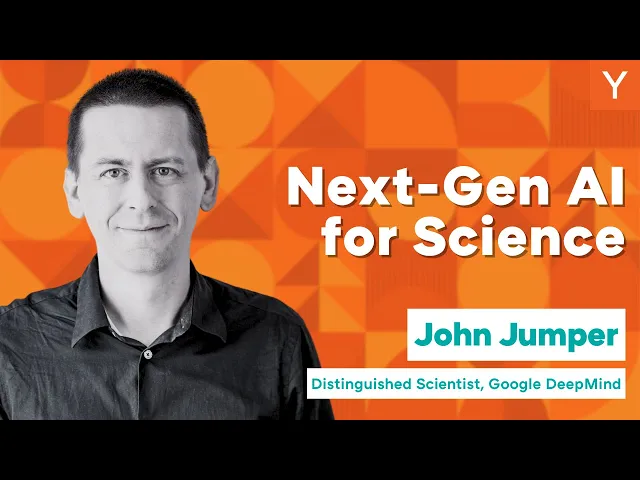John Jumper: AlphaFold and the Future of Science

AlphaFold transforms scientific discovery
The intersection of artificial intelligence and scientific research has never been more promising. John Jumper's groundbreaking work on AlphaFold represents a paradigm shift in how we approach one of biology's most fundamental challenges: protein structure prediction. In a wide-ranging conversation, Jumper reveals not just the technical achievements behind AlphaFold but also paints a compelling vision for how AI will revolutionize scientific discovery across disciplines.
Key insights from Jumper's discussion:
-
AlphaFold solved a 50-year scientific challenge by creating a neural network that can accurately predict three-dimensional protein structures from amino acid sequences, transforming what was once a painstaking experimental process into a computational one.
-
The approach combined deep learning with scientific domain knowledge, demonstrating that AI systems work best when they incorporate both machine learning techniques and established scientific principles rather than treating problems as pure data challenges.
-
Open-sourcing the technology and database has democratized access to protein structure information, enabling researchers worldwide to accelerate their work across fields from drug discovery to fundamental biology.
-
AI's role in science is evolving from tool to collaborator, with systems like AlphaFold augmenting human scientists' capabilities rather than replacing them, creating a new model for scientific progress.
The overlooked breakthrough: AI as scientific partner
The most profound insight from Jumper's discussion isn't about AlphaFold's technical capabilities, impressive as they are. It's about the emergence of a new relationship between artificial intelligence and scientific inquiry.
Traditional scientific progress follows a well-established pattern: hypothesis formation, experimental design, data collection, analysis, and theory refinement. This process, while powerful, is inherently limited by human cognitive capacities and the physical constraints of laboratory work. What AlphaFold represents isn't merely automation of existing processes but an entirely new approach where AI systems become active participants in the scientific method itself.
This matters tremendously because we're witnessing the birth of what might be called "augmented science" – where human creativity, intuition, and expertise combine with AI's computational power and pattern recognition abilities to tackle problems previously considered intractable. In an era where scientific challenges like climate change, disease, and sustainable energy demand unprecedented innovation, this partnership model could dramatically acceler
Recent Videos
How To Earn MONEY With Images (No Bullsh*t)
Smart earnings from your image collection In today's digital economy, passive income streams have become increasingly accessible to creators with various skill sets. A recent YouTube video cuts through the hype to explore legitimate ways photographers, designers, and even casual smartphone users can monetize their image collections. The strategies outlined don't rely on unrealistic promises or complicated schemes—instead, they focus on established marketplaces with proven revenue potential for image creators. Key Points Stock photography platforms like Shutterstock, Adobe Stock, and Getty Images remain viable income sources when you understand their specific requirements and optimize your submissions accordingly. Specialized marketplaces focusing...
Oct 3, 2025New SHAPE SHIFTING AI Robot Is Freaking People Out
Liquid robots will change everything In the quiet labs of Carnegie Mellon University, scientists have created something that feels plucked from science fiction—a magnetic slime robot that can transform between liquid and solid states, slipping through tight spaces before reassembling on the other side. This technology, showcased in a recent YouTube video, represents a significant leap beyond traditional robotics into a realm where machines mimic not just animal movements, but their fundamental physical properties. While the internet might be buzzing with dystopian concerns about "shape-shifting terminators," the reality offers far more promising applications that could revolutionize medicine, rescue operations, and...
Oct 3, 2025How To Do Homeless AI Tiktok Trend (Tiktok Homeless AI Tutorial)
AI homeless trend raises ethical concerns In an era where social media trends evolve faster than we can comprehend them, TikTok's "homeless AI" trend has sparked both creative engagement and serious ethical questions. The trend, which involves using AI to transform ordinary photos into images depicting homelessness, has rapidly gained traction across the platform, with creators eagerly jumping on board to showcase their digital transformations. While the technical process is relatively straightforward, the implications of digitally "becoming homeless" for entertainment deserve careful consideration. The video tutorial provides a step-by-step guide on creating these AI-generated images, explaining how users can transform...
